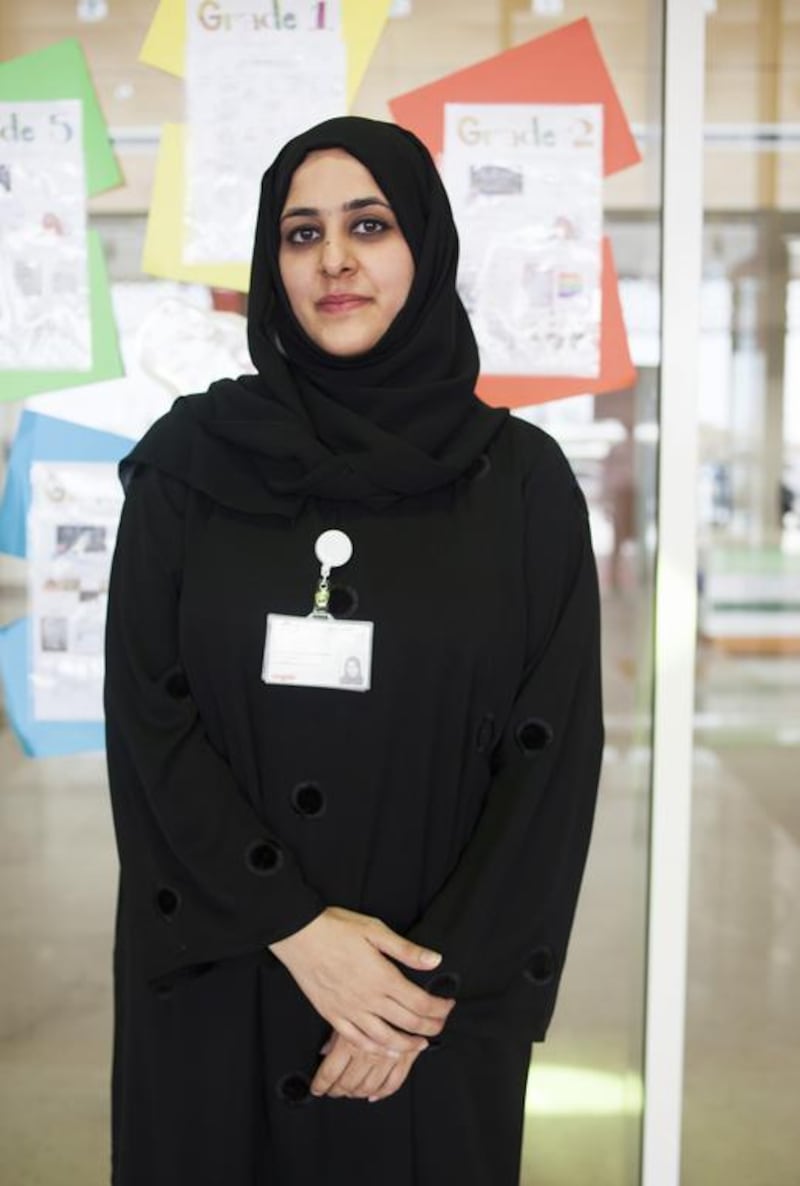ABU DHABI // When it comes to private security in the UAE, Mariam Mohamad Abdulrahman is a bona fide trailblazer.
The 27-year-old is one of the first Emirati women trained to work as a private security officer in the region.
“I’m telling you today, overall in the GCC security, there is no national, local female guard anywhere,” said Ahmed Salah El Din, the project manager for the Abu Dhabi Education Council’s G4S security project.
“This is a first for the UAE and the GCC. In private security and business, this is the first time.”
Ms Abdulrahman comes from a family of law enforcement professionals – her father is an officer with Dubai Police, her sister is with Abu Dhabi Police and several of her relatives are in the UAE military.
She said it seemed only natural to follow in her family’s march towards a career in public safety. In fact, she sees it as her national duty.
“I’m proud to be one of the first female security guards who is a local,” Ms Abdulrahman said. “I feel like I am serving my nation.”
Despite missing the cut-off age to join the police force by a mere few months, she did not give up on her aspirations.
Her opportunity came in 2013 when Adec, which governs public and private schools in the emirate, launched an Emiratisation drive in an attempt to get more Emiratis working as security officers in public schools, where 80 per cent of the student population are nationals.
Like all 300 Emiratis who applied for the job, Ms Abdulrahman was not required to have any prior security experience.
But she did have to have a high-school diploma, spoke and wrote Arabic and English, and passed interviews with Adec and with the UAE’s largest security company, G4S - one of two businesses that provide security guards to Adec.
The 45 successful candidates, including two Emirati men, were enrolled in a five-day security training programme with G4S. They are now preparing for a four-week course with the National Security Institute in Abu Dhabi.
Including expatriates, there are about 1,000 security guards working in Adec’s 254 facilities, including schools and other establishments. They are managed by G4S and Spark Security Services.
The Emirati security guard’s training is focused on how to maintain safe operations within the school building, fire safety and conflict resolution.
Ms Abdulrahman’s nine-hour workday begins just before 7am. She patrols the halls and classrooms of her school, Al Ezzah in Bani Yas, to ensure everything is in safe working order before the students arrive.
She then spends the remainder of her day stationed at the reception area near the school’s main entrance. She also helps the teachers to keep the children in line.
“I like working in the school system and love helping being responsible for the kids’ security,” Ms Abdulrahman said.
Sultan Al Marzooqi, Adec’s area manager, said Ms Abdulrahman quickly developed a bond with the students when she started working at the school in January.
“There is a good relationship between her and the students because she tells them to listen to her instructions, to follow the line,” he said. “She tells them that if you do something good, I will get you something nice. I think that’s nice, I like that.
“They think she’s a police, but a nice police. They call her the police lady.”
Ms Abdulrahman said that her goal was to work her way up to a supervisory position where she can oversee other security guards. She is also considering returning to school to pursue a law degree.
Adec says the security guard Emiratisation programme has been very successful, and it hopes to double the number of Emirati guards in schools within a year.
“All the local female guards who chose to work in that profession in the schools, they accept it as a national honour – they’re serving their nation,” said Mr El Din. “They’re serving their families. Because at the end of the day the students, it’s about the country’s future.
“They are not here about the salary, of course. The salary compared to other professions, it’s low, not that high.
“She has a higher secondary school diploma, she could be deployed in other professions. She could have a much bigger salary but she’s proud to work in security to serve her nation.”
rpennington@thenational.ae






